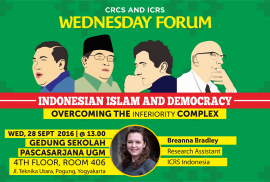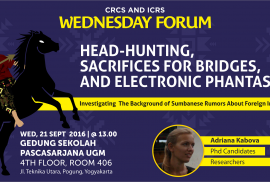
Abstract
Who has the authority to end the discrimination and violence religious minority groups continue to face despite protections promised in Indonesia’s constitution? This talk examines three recent cases—the Ahmadiyya in West Java, Shi’a in East Java, and two HKBP churches also in West Java—to show how the three kinds of authority (legal-rational, traditional, and charismatic) identified by Max Weber are all used to legitimate extremism and violence in the face of contradictory actions by the government, including religious leaders with institutional authority inside it. Unless the actors in the government recognize that they must use their authority responsibly, extremist religious leaders who seek to mobilize hate against others, especially minorities, will continue to be able to do so and Indonesian society will remain immature.
Speaker
Imanuel Geovasky is graduated from School of Public Policy and Social Research International Christian University, Tokyo, Japan. He got Japan ICU Foundation Scholarship (JICUF) (New York based) and United Board for Higher Education in Asia (UBCHEA) (New York and Hongkong based) Faculty Development Scholarship for Master Degree in Peace Studies at International Christian University, Tokyo, Japan, from September 2013 – July 2015. His focus research on Religious-based violence and discrimation against minorities in Indonesia society, Human security and Peace building.

Abstract
Indonesian Islam connotes a pluralistic form of faith that is open and deeply engages local-specific cultures that concurrently emphasize a rigorous pursuit of social justice and equality for all. Despite the voluminous scholarship on Indonesian Islam, its correlation with Muhammadiyah’s “Islam Berkemajuan” and Nahdhatul Ulama’s “Islam Nusantara”—each having its own vision for a good society—remains woefully unexplained. This paper explores the interplay between Indonesian Islam and the praxis of democracy within the historical context of overcoming an apparent inferiority complex suffered by some segments of the Muslim community. The authors argue that as much as Indonesian Islam may have proven itself to be distinct from ‘the other Islams’, commonly found in its birthplace in the Middle East, there is still much to be desired for in terms of how to confidently overcome the historical baggage as a once colonized people. Using Said and Foucault’s analytical frameworks, the paper argues for a less humble attitude toward the propagation of Indonesian Islam to the outside world, given the protracted period of instability in the Middle East, ongoing terror attacks in different parts of the world and the politics surrounding Islamophobia.
Speaker
Breanna Bradley is an undergraduate student at Georgetown University’s Edmund A. Walsh School of Foreign Service located in Washington, District of Columbia, USA. Bradley’s studies focus on the relationship between culture and politics in Southeast Asia. She is currently a research assistant at the Indonesian Consortium for Religious Studies (ICRS), a Ph.D. program in Inter-Religious Studies located at Universitas Gadjah Mada, Yogyakarta, Indonesia. She has previously held positions as an undergraduate research fellow at Georgetown University’s Berkley Center for Religion, Peace and World Affairs and as a program coordinator for Georgetown University’s D.C. School’s Project, a program aimed to provide English language access for the immigrant community of the Washington DC area. She is interested in the role that Indonesian Islam plays in Indonesian culture and politics and is currently assisting with research surrounding the Tabot festival, a festival with its roots in Shia Islam celebrated by a majority Sunni community every year in Bengkulu, Sumatra.
 Judul
Judul
Dari Masjid ke Panggung Politik, Melacak Akar-akar Kekerasan Agama Antara Komunitas Sunni dan Syiah di Sampang, Jawa Timur
Penulis
Muhammad Afdillah
Penerbit
CRCS 2016
ISBN
978-602-72686-6-1
Harga
Rp 70.000,-
Beberapa aspek politik dan kekerasan Sunni-Syiah di Sampang dibahas di dalam buku ini. Salah satu di antaranya penyebab konflik antara komunitas Sunni dan Syiah di Sampang. Selain itu, buku ini membahas dinamika konflik Sunni-Syiah, khususnya eskalasi konflik yang terjadi seiring dengan berjalannya waktu dan kegagalan intervensi dan penanganan terhadap konflik tersebut. Buku ini juga membahas usaha – usaha rekonsiliasi kedua komunitas, khususnya setelah kekerasan terbuka yang terjadi di Bulan Desember 2011 dan Agustus 2012.
(Samsu Rizal Panggabean, Pengajar di Magister Perdamaian dan Resolusi Konflik di Fakultas Ilmu Sosial dan Ilmu Politik, Universitas Gadjah Mada).
__________________________
Bagi yang tertarik, bisa menghubungi:
Divisi Marketing CRCS UGM
Gedung Lengkung Lantai 3
Sekolah Pascasarjana Universitas Gadjah Mada
Jl. Teknika Utara, Pogung, Yogyakarta, Indonesia 55281
Telephone/Fax : + 62-274-544976

Abstract
Rumors about head-hunting and construction sacrifices have been recorded in Southeast Asia since the beginning of 20th century. My focus is on the present-day form of these rumors on the island Sumba, Eastern Indonesia. First directed especially at the Dutch colonizers, stories about foreigners seeking for body parts have continually absorbed new features. In 1990’s, they focussed on new technologies that were imagined as electronic phantasms. Nowadays they target tourists and immigrants as well as people deviating from social norms. Following Jean-Nöel Kapferer, who defined rumors as one of the defense mechanisms by which members of communities try to preserve their old ways, I interpret Sumbanese rumors as a way for Sumbanese to define themselves in opposition to outside forces and as a tool for maintaining norms in society.
Speaker
Adriana Kábová earned her Master’s degree in Ethnology from the Charles University in Prague, Czech Republic. She is a PhD candidate in Anthropology, also at the Charles University in Prague, and is currently on an internship in the Pusat Studi Pariwisata at UGM. Her research interests include tourism and contemporary legends in Southeast Asia.
CRCS | News
Apakah Seni? Apakah ia selalu berhubungan dengan estetika atau keindahan, atau sesuatu yang melahirkan kesadaran dan perubahan? Dan apakah agama? Apakah ia adalah sesuatu yang ada begitu saja dari langit atau ada melalui proses sejarah yang kemudian mendapatkan pengesahan dari negara?
Sebuah pameran seni bertema agama tengah berlangsung di sebuah rumah seni Lir Space, Yogyakarta dari 3 sampai 17 September 2016. Namun jangan berharap melihat keindahan didalam pameran ini karena yang dipamerkan bukan benda-benda estetis relijius, semisal kaligrafi atau lukisan-lukisan spiritual, tetapi sesuatu yang lain yang menggugah kesadaran.

Kegiatan seni bertajuk Exhibition Laboratory ini memilih beberapa seniman muda untuk menjalani proses selama tiga bulan agar dapat mempersiapkan pameran tunggal masing-masing. Kali ini dua seniman muda dengan latar belakang yang berbeda diundang untuk berproses mempersiapkan karyanya masing-masing. Salah satunya adalah Daud Sihombing, salah satu fresh graduate Program Studi Agama dan Lintas Budaya (CRCS), UGM.
Dalam pamerannya ini Daud Sihombing memilih tema REIFIKASI, yang secara sederhana bisa diartikan sebagai proses pembentukan agama dari yang mula-mula abstrak menjadi sebuah wujud yang sistematis. Ia memilih untuk menciptakan pamerannya berdasarkan esai singkat yang diterbitkannya pada tahun 2015: “Agama di Indonesia: Awal Mula dan Problematikanya”. Tulisan tersebut berangkat dari konsep reifikasi dalam buku “The Meaning and End of Religion” karya Wilfred C.Smith yang kemudian dikaitkan dengan praktek standardisasi agama di Indonesia. Praktik standardisasi atau penyesuaian untuk kemudian dapat diakui sebagai agama ini tercantum pada Peraturan Menteri Agama No. 9 Tahun 1952, yang menyebutkan beberapa persyaratan seperti; percaya akan satu Tuhan (monotheis), memiliki kitab satu kitab suci, memiliki nabi sebagai pembawa risalah, dan memiliki tata agama dan ibadah bagi para pemeluknya.

Dalam pameran ini, Daud membuat visualisasi bagi esai tersebut sekaligus menciptakan sebuah peristiwa seni dan menjadikan ruang galeri sebagai sebuah kantor badan sertifikasi. Melalui keberadaan kantor lembaga ini, Daud mencoba melihat bagaimana sebuah kepercayaan dapat perlahan masuk ke dalam kategori agama yang diakui oleh negara melalui simulasi kerja sebuah lembaga pemerintah dalam melakukan sertifikasi. Pengunjung pameran ini dapat menjalankan sebuah simulasi untuk mendaftarkan agama atau kepercayaan mereka dari tahap pendaftaran hingga lolos dengan pengakuan yang sah. Kehadiran badan sertifikasi fiktif (yang saat ini belum dimiliki oleh negara) ini tidak saja akan menunjukkan bagaimana praktik standardisasi di Indonesia, yang konon kerap mempersulit posisi kepercayaan lokal untuk dapat diakui oleh negara namun juga menjadi celah untuk membicarakan sikap negara saat ini terhadap kekayaan budaya.
Pameran bisa dikunjungi di:
Lir Space, 3 – 17 September 2016, Jam 12.00 – 20.00 WIB
Jl. Anggrek I/33, Baciro, Yogyakarta.

Abstract
In many Muslim-majority societies,the widely accepted Islamic doctrine that men are to act as the ‘imam’ or leaders of the family lies at the bedrock of Muslim masculinity and male religious identity, but its meaning changes for Muslim men who live as a minority in liberal and increasingly secular societies such as Australia. Based on a sociological study of the issues and challenges facing Southeast Asian Muslim men living in Melbourne, I argue that the family does serve as a secure zone for preserving and exercising Islamic-associated practices of masculinity, but also that men are pressed to redefine the meaning and continually negotiate practices of leadership to cope with the demand for individual freedom and autonomy in the family as fits the much different social context. Finally, I call for more attention to the importance of masculinity as an analytical framework in religious studies.
Speaker
Rachmad Hidayat is a fellow and Project Director in the Kalijaga Institute for Justice, State Islamic University Sunan Kalijaga, a research associate at the Asia Institute, the University of Melbourne and previously was a visiting scholar at the Institute for Politics, Religions and Society, the Australian Catholic University. He earned a PhD in 2016 and MA in 2010 both at Monash University. Rachmad had worked at the State Islamic University Sunan Kalijaga as a project officer and research officer for programs fostering gender mainstreaming in religious contexts. His academic interests focus on how the discourse of masculinities and femininities sociologically shape and are shaped by dominant imbalance power relationship in families, institutions, academia, and religion. He has published Ilmu yang Seksis (Sexism in Sciences, Jendela 2004), Men’s Involvement in Reproductive Health, an Islamic Perspective, (with Hamim Ilyas, PSW 2006), some book chapters and journal articles about gender and masculinities.





